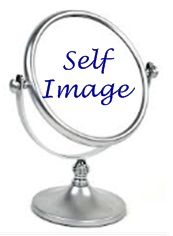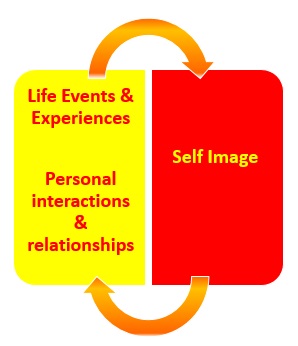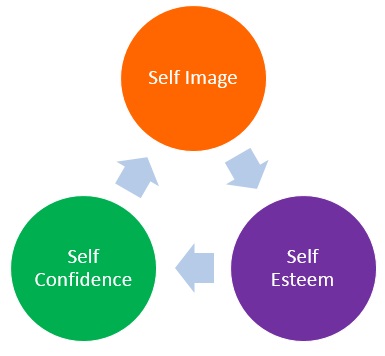Self-Image
Self-Image is how you see yourself. It is the mental picture that you have of yourself that has been created by numerous self-impressions that have built up over time. It encompasses your physical attributes as well as your personal characteristics, traits, and abilities.
Self-image also incorporates how you view and assess your strengths and weaknesses. This assessment of your abilities, attributes, and characteristics form a collective representation of who you are as you see yourself – your self-image.
Your self-image includes:
- What you think you look like
- How you view your abilities
- How you view your personality traits
- What you believe others think of you
Positive or Negative
You will see yourself in a positive or negative way depending on how you feel about yourself. If you feel good about yourself, you will have a positive self-image. Conversely, if you do not feel good about yourself, you will have a negative image. If you have a positive image of yourself, you recognize your strengths and potential while being realistic about our shortcomings and limitations. If you have a negative image, you focus on your faults and weaknesses, often playing down your strengths while exaggerating your failures and imperfections.
Objective and Subjective Assessments
Self-image stems from both objective and subjective assessments. Objective assessment are those that are not influenced by personal feelings or opinions and represent facts. Objective assessment may include such attributes as height, weight, hair color, eye color, and IQ. Subjective assessments, in contrast are those evaluations that are based on or influenced by personal feelings or opinions. Subjective assessments for your image may include such traits as caring, patient, generous, stubborn, and humorous.
Because the image you have of yourself is a collective representation of your perception of who you are, it ultimately becomes more subjective than objective. This is because your perception of yourself is formed by your unique thoughts and beliefs, thus it will create a biased view. You place your individual biases into your assessment, so even objective assessments become biased. For example, instead of seeing your weight as 153 pounds (objective), you may simply see yourself as overweight (subjective).
Since it is how you see yourself, self-image has a tendency to be judgmental. People tend to be critical of themselves, finding their flaws and place more emphasis on their flaws than on their good points. Personal judgments may include “I am overweight,” “I have ugly hands,” “I am stupid,” “I am clumsy,” I am impatient”, etc…
Additionally, because it is subjective and biased, it can be very different from how others see you. For example, you may see yourself as overweight, while others see you having the perfect body type and weight.
Cycle and Influences
Your self-image is generally resistant to change. However, it is not permanently fixed. You continually take in and process information to evaluate yourself in multiple areas such as physical appearance, performance, and relationships.
Influences
Your self-image is influenced by both events (life experiences) and personal interactions (relationships) that affect you. Your interactions with family members, peers, and friends can significantly affect the way you view yourself. Relationships reinforce what you think and feel about yourself. Therefore, if they are positive and encouraging relationships, chances are you will have a positive image. However, if those relationships are destructive and disparaging, you may developed a poor image. For example, if you have supportive parents who reinforce your positive attributes and abilities, that will help create a positive image. If, however, you are criticized and berated by your peers, you will often develop a poor image.
As indicated above, your life experiences and events can also influence your self-image in many ways. For example, failing at a task can cause you to look at yourself negatively. Your image can also be affected by other experiences such as information you take in from sources such as the media. For example, the media may portray the perfect body type differently from your body type, which may cause you to have a different perspective on your body.
Cycle of Influence
As your self-image is influenced by your experiences and relationships, conversely, it can help shape your experiences and relationships. For example, feeling good about yourself can lead to a better performance on a task. If you have a positive self-image and feel good about yourself, you will have an optimistic attitude. People like other people who have positive and optimistic attitudes. Therefore, when you interact with other people, those interactions will be uplifting and rewarding. In turn, that constructive relationship continues to feed and positively influence your image.
Relation to self-esteem and self-confidence
Self-image is important because how you view yourself affects how you feel about yourself and how you interact with others. Self-image affects both your self-esteem and self-confidence. Although separate elements or constructs of “self”, they are closely tied to one another.
Self-image is how you see yourself and how you believe others see you.
Self-esteem is your opinion of your own worth.
Self-confidence is the assurance you have in yourself and your knowledge, judgment, and abilities.
They are all closely connected because if you have a poor image of yourself, you will have low self-esteem or self-worth, and not be confident in yourself. Conversely, if you have a positive self-image, you will have high-esteem and high self-confidence.
Importance of Self-image
It is important to have positive images when you think of yourself. How you see yourself will affect your thinking, your behavior, and how you relate to others. Self-image has a very significant impact on your happiness in life. A positive image can enhance our physical, mental, emotional, and spiritual well-being. Conversely, a negative image can decrease our satisfaction and ability to function in these areas. Your view of yourself and your outlook on life can affect those around you. People respond to you either positively or negatively according to how you portray yourself. Your confidence in relationships depends on the image you have of yourself. If you present a positive image and self-confidence, people will be more likely to see you as a positive and talented person. A positive self-image starts with learning to accept and love yourself. It also means being accepted and loved by others.




